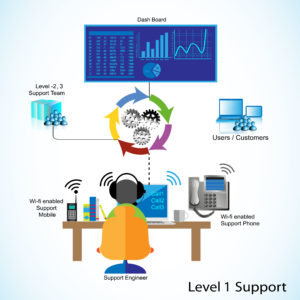An effective process? Start with correct ticket assignment
A key determinant of the efficiency and often the effectiveness of ticket management processes in the IT world is the assignment of the task to the resource or company expected to handle it. A key determinant of the efficiency and often the effectiveness of ticket management processes in the IT world is the task assignment to the resource or company expected to manage it.
Ticket assignee’s responsibility: what to consider?
The first challenge is to identify precisely which person, or which company, is in charge of the activity, based on its expertise, availability, or previously executed contractual arrangements.
The assignee will need to have a significant amount of information at disposal in order to fulfill the assignment to the best of one’s ability and possibly in the shortest possible time.
Now, within your IT Team, who has the appropriate skills and abilities?
Does this already fall under your job description?
Can IT choose an external supplier? 
As a matter of fact, if the person who has to handle the ticket assignment activity cannot do so for various reasons, whether it be technical or time-related, it will be necessary to provide an alternative choice outside the IT organization as well. This implies other expenses to be expected.
Therefore, having a correct and in-order overview of the contractual framework related to service providers will enable the assignment task to be carried out thoughtfully and accurately.
Since this is a crucial moment for service processes and the IT that must manage them, the IT department frequently sees specifically assigned workers spending their time between phone calls for service requests and identifying the internal IT technicians or supplier to assign them to. Since these requests are fast-paced and unpredictable, very often the IT team figure usually manages to perform other work with proper focus.
The expensive nature of this activity, and the resulting frustration in managing them, increasingly puts IT in the position of choosing contracts and suppliers that perform an increasing number of services, thereby reducing the amount of choices to be made and speeding up the allocation process.
It is essential to know who are the responsible, skilled providers with appropriate established commitments in order to make this step efficient and make the ticket allocation process flow quickly. Contractual agreements must define what expertises the provider has and ideally which maintenance or support service assets they refer to.
Have got the right supplier. What’s next?
Once the suitable provider has been identified, it is time to submit the service request by tracking its timing. This tracking is essential to highlight the expected time and schedule provided by the support service
Expected time and schedule to be communicated. How do you deal with SLA?
In terms of waiting time, it is highly recommended to also inform the user who made the request that the assignment has been made, what the provider is, and what waiting time is to be expected because of contractual commitments. By providing an explanation to the user who reportedly has a problem regarding the assignment, it allows, on the one hand, to provide a record of service management and organization and, on the other hand, to ease the user’s concern over the existing problem. Therefore, having contracts with providers that include SLAs, Service Levels of Service, explicitly expressed with clear and comparable performance metrics on which to do monitoring and statistics is very important.
Ticket assigned, request submitted. How do I track the request when it is taken in charge?
As soon as the request has been assigned and actually forwarded physically to the appropriate IT entity, it must have a record that IT has actually seen the request and that it confirms the reception. As a rule, this activity is done through electronic mail. Is it possible to track this passage?
Why is it important to know who will take care of the business for you?
An intake by the resource in many organizations makes it possible to give notice to the end customer of who will be the person in charge for the task, and such, in areas where there is an access security problem for the company itself and its offices, is even more important.
Therefore, it only remains to wait for the assigned service provider, supplier firm or IT technician, to carry out the activity, resolve the problem, and provide feedback to both IT and the end customer.
Let’s take a step back from the situation. What if I want to outsource this process? What are the ‘cons’ of skipping the assignment stage?
In fact, it is not uncommon for IT to arrive at conditions where it enters a global service contract leading to a single provider to be contracted. In fact, the latter solution even allows users to be provided with the provider’s number, and thus completely skip the assignment phase carried out by IT itself.
However, if IT chooses a single support provider and wants to bypass the ticket assignment phase altogether, it is essential to consider some potential difficulties, foremost among which is the loss of control of the request management process. The users submit requests completely freely to the provider by themselves without having IT’s perceptions and immediate objective data on the status of arising problems, the provider is not monitored in real time, and service data is collected afterwards when the process is over. Thus, a tricky move that frequently happens when trying to assign service entirely to global service is that of also relying on the provider’s service management information system; in this way you end up controlling the auditee with its own tool!
What Tesis can do for IT to make the ticket assignment process efficient
Tesis is the Technical Support Management Information System that helps IT manage these processes precisely, efficiently, and thoroughly.
Through precise mapping of the business assets being serviced, whether they are services rather than software applications or technologies, it identifies who is responsible for its maintenance and/or the user who uses it. This technology and services are most often taken over by network discovery systems and active directory management systems that Tesis can integrate with. The advantage the Tesis tool brings at this stage extends to the ability to track information from the service life of these map components, such as installation data, warranty coverage and asset inventory, etc.
Well, how important is it for you to know at any moment which resources to focus on and what the workloads of each of them are?
In addition to the proper and complete maintenance services and assets mapping, Tesis provides the facility to describe the organization in charge of managing these services , whether internal resources or external resources such as suppliers. Specifically for internal resources, it is possible to specify contractual commitments and their time availability, while also tracking absences in the office. This allows IT to know at any moment which resources to focus on and what the workloads of each of them are. Hence, it will not be difficult for IT to decide and when to use external services or internal resources, and not least to demonstrate to management the need to adjust the workforce by highlighting the workloads it is carrying.
Avoid future frustration by easily assigning tickets to the best resource
Matching the business asset mapping targeted for assistance, whether services rather than technologies, with a description of the organization responsible for managing them, provides precise information that helps those who have to make the assignment to perform this task with accuracy, an accuracy that can reach the automation that saves IT operators time and frustration.
How can I better manage service contracts with my providers?
Tesis allows you to manage contracts with service providers The assets and or services that are covered by the contract, the duration of the contract, and especially the quality parameters within which the service is to move (contractual SLAs) are evident within these contracts. The record of these contracts is immediately visible when the assignment is to be made. The data accuracy at the disposal makes it possible to arrive at automatic service provider assignment.
Why Tesis is the best ticket management tool for IT
Tesis is the tool for IT through which you can manage service processes and monitor providers without thinking about having to rely on them. Ticket process management and configuration systems allows for the evaluation of each stage of the service process by identifying progress states and responsibilities in real time allows IT to make immediate decisions in accordance with the problem as well as carrying out accurate retrospectives that allow for continuous improvement in the organization.
Learn how Tesis can help you manage ticket assignment
Ask for a demo of Tesis



